The troubles on Columbia University’s campus began over six months ago, long before last week’s protests. Shortly after Hamas’ October 7th attack on Israel, a box truck covered in LED screens displaying the names and photos of dozens of Columbia students started circling a pro-Palestine protest near the university’s Morningside Heights campus. The truck, paid for by the conservative nonprofit Accuracy in Media, called the students “Columbia’s Leading Antisemites.”
-


پی ٹی آئی میں خوشی کا سماں #gnn #pti #aliamingandapur #court #news #breaking #latest #video
-


کپتان کے کھلاڑی کے اہم انکشافات #gnn #imrankhan #pti #umarayub #news #breaking #latest #video
-


PM Shehbaz To Leave For Saudi Arabia Today | Breaking News | GNN
-


عمران خان مذاکرات کے لیے تیار؟ #gnn #imrankhan #pti #jail #news #breaking #latest #video
Technology
Columbia University has a doxxing problem
The Columbia student encampment protesting the university’s ties to Israel has become a flashpoint of the culture war. Doxxings from the outside have irrevocably shaped campus discourse on the Israel-Hamas war.

“I literally did not leave my apartment the days my friends told me about it,” a computer science undergraduate, whose name was listed on the truck, told me outside the Columbia encampment on Tuesday afternoon. The student, who did not wish to be identified for fairly obvious reasons, said her name was listed on the truck because a club she was no longer a part of had signed onto an open letter urging Columbia to cut ties with Israel. It was a traumatizing experience for her. “I completely wiped as much as I could of my online presence and stayed in my apartment as much as I could,” the student said. “I felt like I couldn’t go to classes.”
Like most of the other people who filtered in and out of the encampment, the student stayed masked as we spoke. Students covered their faces with surgical masks, sunglasses, and kaffiyehs, both to prevent spreading covid-19 in close quarters and to shield themselves from the prying eyes of outsiders who they feared would target them over their involvement in the encampment.
At Columbia and elsewhere, pro-Palestine protesters have attempted to balance their public-facing activism with increasingly dire concerns over their privacy and safety. People who have attended marches or rallies, organized fundraisers for displaced Palestinians, or belonged to certain campus clubs have found themselves and even their families on the receiving end of relentless online harassment after their names were publicized by anonymous accounts that claim to combat antisemitism. In some cases, they have even lost their jobs.
For the students targeted by the “doxxing truck,” the intent was clear: they were being intimidated for supporting Palestinians and, in some cases, for their race or religion. (One student whose name and photo were displayed on the truck sued Accuracy in Media in November for “defaming and stigmatizing” him. The student was the former president of an Arab cultural group on campus and says he did not sign onto the letter.) The harassment of student activists at Columbia and elsewhere has only intensified since then, often spilling over into the physical world.
In the enclosed environs of a college campus, a student’s first and last name is not exactly top secret sensitive information. But when placed into a certain context and disseminated through certain media streams outside the confines of the university, a name becomes a liability — and for bad-faith actors, a weapon that can be wielded against students.
“Early on, in October, I tried to speak with administrators to help them understand the gravity of the target they were placing on their students by allowing this doxxing to continue,” Darializa Avila Chevalier, a Columbia alum who was involved with Students for Justice in Palestine as an undergraduate, told me on Wednesday. Columbia announced a “doxxing resource group” last November, a response Avila Chevalier and other students described as insufficient. (Columbia University did not respond to a request for comment.)
Avila Chevalier, who graduated from Columbia in 2016, was among the first students to be featured on Canary Mission, a database that describes itself as dedicated to exposing antisemitism. Since its inception, Canary Mission has conflated antisemitic hate speech with pro-Palestinian activism; Avila Chevalier was posted on the database for her involvement in the BDS (Boycott, Divestment, and Sanctions) movement. The Israeli government has used Canary Mission to bar political activists from entering the country, Haaretz reported in 2018. Since October 7th, Canary Mission has doxxed protesters across the country.
A graduate student involved in the encampment pushed back at the notion that protesting Israel’s treatment of Palestinians is antisemitic. “A lot of the organizing is run by Jewish students,” he said. “There was a seder here, there was a passover celebration here, and all of that is neglected.” The graduate student was previously doxxed by Canary Mission over his undergraduate activism at a different university.
The week before, police officers in riot gear descended upon Columbia University’s campus to break up an encampment set up by student protesters. Moments later, university president Minouche Shafik claimed she sent the officers in for students’ safety. “I took this extraordinary step because these are extraordinary circumstances,” Shafik wrote in a statement published last Thursday afternoon. “The current encampment violates all of the new policies, severely disrupts campus life, and creates a harassing and intimidating environment for many of our students.”
Police arrested more than 100 students who had occupied Columbia’s south lawn to demand that the university divest its $13 billion endowment from companies that support Israel. Officers tore down the tents students had set up the previous morning around 4AM and trampled on signs declaring the encampment a “liberated zone,” an echo of the anti-war protests that swept college campuses across the country, including Columbia’s, in 1968. Less than a day later, the tents were back, with hundreds of new students taking the place of their classmates who had been arrested and barred from campus.
Visitors to the encampment are greeted by a tall sign announcing its community guidelines — no littering, no drugs or alcohol, no engaging with counterprotesters, no talking to cops — and a handful of volunteers in yellow vests who control the incoming flow of people. The lawn is a maze of green and blue tents, some of which are decorated with Palestinian flags. The arrangement appears to shift from day to day; tents go up and come down, tables are rearranged, but the sense of organized chaos persists. The liberated zone, as the students have taken to calling the quad, is a hive of activity. Students flit around unpacking boxes of snacks and making signs. Inside, I spot two obviously DIYed shirts that read “Minouche Sha-fuck you.” Almost all the students are masked; the reporters among us are identifiable by both our press badges and our bare faces.
“You see people trying to make themselves almost unrecognizable out of fear of losing jobs, fear of being attacked by this administration,” Dalia, a first-year student at Columbia, told me. Dalia, who is Palestinian, said she enrolled at Columbia because of the legacy of professors like postcolonial scholar Edward Said. She has now begun to see the campus as a hostile place for Muslim and Arab students. Three days before Dalia and I spoke, Shai Davidai, an adjunct professor at Columbia’s business school, posted a video on X of Muslim students praying. The caption: “This is Columbia University, right now. Please share to let the world know.”
“I think the fact that such open anti-Palestinian rhetoric, anti-Islam rhetoric is able to proliferate by members of this community — by certain faculty — without any single response or utterance from the administration is crazy,” Dalia said. (Rep. Ilhan Omar (D-MN) asked Shafik about Davidai by name during a congressional hearing last week. Shafik said that he was under investigation for harassment and added that “attacking our students is unacceptable.” On Monday, Davidai was denied entry to Columbia’s main campus, though he was still allowed to access the business school.)
Dalia and I spoke in a cordoned-off press area of the encampment on Monday. In the days since the university sent in the NYPD to arrest the first wave of protesters, the students who took over the quad had set up a media operation of sorts. They let reporters in a few at a time, or sometimes not at all, and asked us not to photograph students without their consent. Instead of approaching protesters for interviews, reporters were asked to wait in the press area until liaisons — other students — brought over people who were interested in being interviewed. Critics in the media have accused the student protesters of illiberally trying to stifle the free press. The students, meanwhile, maintain that they’re trying to protect the most vulnerable among them while ensuring that their message — the desire for Columbia to divest from business interests in Israel — remains at the forefront.
A protest’s power lies in its numbers. In singling demonstrators out and targeting them one by one, the people going after students aren’t just targeting individuals; they’re trying to hobble a broader movement.
Several students told me they were harassed after speaking to the press. Jonathan Ben-Menachem, a PhD candidate in Columbia’s sociology department, said he received a flood of emails accusing him of being a “self-hating Jew” after writing an essay about how he feels safe on campus. Jared, a graduate student at Columbia, said he and other Jewish students have been called “Judenrat” and “kapos” for supporting the encampment. “I had previously been giving interviews with my last name, and a family member of mine was left a voicemail asking if he was a self-hating Jew just like me,” said Jared, adding that Arab and Muslim students are bearing the brunt of the harassment. “There’s definitely a lot of threats from the outside, but this is not a threatening mob,” he said of the encampment.
The encampment, all things considered, is extremely chill. When I walked around on Monday, I saw students lounging in their tents, doing homework, and generally hanging out. There was a craft corner where people could make pro-Palestine signs: among them were pieces of cardboard and cloth that read “Anti-imperialism is feminist” and “End the blockade.” In the middle of the quad, students had set up a snack table — complete with a “nut zone” to accommodate their peers with allergies — that also had sunscreen, water bottles, and ibuprofen available.
“It’s basically just a bunch of nerds,” Jared told me on Wednesday. “And then I go home, check Twitter, and I hear like, ‘Pro-Hamas mob has taken over Columbia.’ There’s a huge disparity between what’s going on here and how it’s been portrayed by the media.”
The most tense hours I’ve witnessed at the encampment occur like clockwork, during the university’s designated media hours of 2 to 4PM. The encampment and its surrounding areas are at their most chaotic during the brief media window: reporters mill about looking for students to talk to, student volunteers scramble to coordinate interviews, and right-wing agitators roam around, hoping to lure undergrads into giving them an inflammatory quote. By 5:30 or 6PM, once the camera crews are mostly gone and the media frenzy has died down, campus life — the encampment included — regains a sense of normalcy.
On Monday afternoon, hundreds of Columbia faculty held a walkout in support of the arrested students, demanding that Columbia lift their suspensions and reinstate their access to campus. “To send riot police to pick up peaceful protesters on our campus was unprecedented, unjustified, disproportionate, divisive, and dangerous,” Christopher Brown, a professor of history, told the crowd of a hundred or so people who assembled on the university steps. “That show of force was a sign of weakness. In trying to show that they meant business, what they showed was their incompetence.”
Brown suggested that Shafik’s crackdown on protesters was an affront to their safety and to the notion of academic freedom. Other professors expressed concern that even innocuous statements in support of their students would get them into trouble with the university. One faculty member who has been the victim of online harassment described a “culture of fear around speaking up for Palestine” at the university.
“I think what we’re seeing is that many faculty are afraid to speak up for their students who have faced harassment, doxxing, arrest, or even eviction over the past several months because their employment at the school is so unprotected and precarious,” the faculty member, who wished to remain anonymous, told me. More than half of Columbia instructors are so-called “contingent” faculty. Over 160 untenured Columbia professors have signed an open letter in support of the arrested, suspended, and protesting students; nearly half the signatories were anonymous.
At a Tuesday afternoon press conference on the edge of Morningside Park, Marianne Hirsch, a literature professor who specializes in Holocaust studies, said the university had fostered “an atmosphere of fear and intimidation in which some people are afraid to tell you their names.”
Mahmoud Khalil, a Palestinian student who has been involved in the negotiations with Shafik’s office, also spoke, saying international students were especially at risk. “I am here on a foreign visa. That’s why for the past six months, I’ve barely appeared on the media,” Khalil said. “That’s why I’m not suspended. I did not participate, fearing that I will be arrested and ultimately deported from this country.”
Later that day, around 10PM, Shafik announced a midnight deadline to reach an agreement with students on “clearing the West Lawn and restoring calm to campus.” Amid negotiations with student representatives from Columbia University Apartheid Divest — the group behind the encampment — Shafik threatened to call both the National Guard and the NYPD, the student group said in a statement. The few hundred students who stayed on the lawn started preparing for arrests, according to the Columbia Daily Spectator. In the end, neither the police nor the National Guard were called: instead, Shafik extended the deadline until the early hours of Friday.
By Wednesday, the media circus was in full swing. As I spoke off the record with two members of the encampment whose faces were covered by sunglasses and scarves, a man approached us and asked why we weren’t in class; off to the side, I noticed provocateur and Proud Boys founder Gavin McInnes. A few hours later, House Speaker Mike Johnson (R-LA) held a press conference on the other side of the quad. “This is dangerous. This is not the First Amendment. This is not free expression,” Johnson said amid boos and chants of “Mike, you suck.” Then he urged President Joe Biden to call in the National Guard.
Rep. Omar made her own visit on Thursday. Omar’s daughter was one of the students suspended when the encampment was cleared last week. Shafik’s early Friday deadline was swiftly approaching. That night, Shafik said there would be no arrests. “There is a rumor that the NYPD has been invited to campus this evening,” she wrote in an email sent to students at 11:08PM. “This rumor is false.”
For Sofia, an undergraduate student who declined to give her last name, the university’s willingness to facilitate the arrest of its own students in the first place suggests that Shafik’s concerns about safety are largely rhetorical. The arrests, she told me on Monday, are “in and of themselves a doxxing event, because all of that becomes public record.” After the first wave of arrests on April 18th, some publications, including the New York Post, published the full names and other identifying information of some students.
If, at a future point, Columbia chooses to send in the NYPD again, after a week of elected officials suggesting that an encampment full of undergraduates making signs at their crafts corner and hosting Passover seders amounts to a national security emergency, the students who find themselves in handcuffs and zip ties will end up with targets on their backs. According to the NYPD’s own chief of patrol, the students arrested on April 18th “were peaceful, offered no resistance whatsoever.” Reports suggesting that the students pose a danger to their classmates only serve to inflame the harassment they’ve been victims of for months.
Dalia, the first-year student, lamented the outsize attention she and her peers have received compared to the war they’re protesting in the first place. “As Palestinians, as Arabs, we have been inherently at risk,” she said. “However, I also think that there really is no comparison to the horrors that are happening in Gaza, the horrors that are happening in Palestine. No amount of student repression — no amount of doxxing — can be equated to that.”
Throughout the week, the students I speak to redirect the conversation back to the war. They ask why their chants are considered violent while counterprotesters seem to get away with spraying students with hazardous chemicals and sending death threats to students who have lost relatives in Gaza. Thursday night, hours before Shafik’s deadline was set to expire, a group of Christian nationalists rallied in support of Israel outside Columbia’s locked-down campus. “Show your face! Show your face!” the demonstrators chanted at students on the other side of the fence. Then some of them tried to storm the gates.
Pakistan
SC moved against judges’ appointment process, asked for proper mechanism
Advocate Akmal Khan asks the Supreme Court to ensure transparent and on merit process and procedure for appointment of the judges in high courts as well as the apex court.

Islamabad: A constitutional writ petition has been moved to the Supreme Court of Pakistan seeking transparency and proper mechanism for appointment of judges in the superior judiciary.
Akmal Khan, a lawyer who has mentioned himself as a whistle blower in the plea, has challenged the existing ways of appointments of judges in the high courts as well as the Supreme Court of Pakistan.
The plea comes to the apex court at such a moment when the issue of the security, privacy of the judges of the superior judiciary has come to the limelight, and many voices have emerged on the conventional and the social media about iappointment process of the judges.
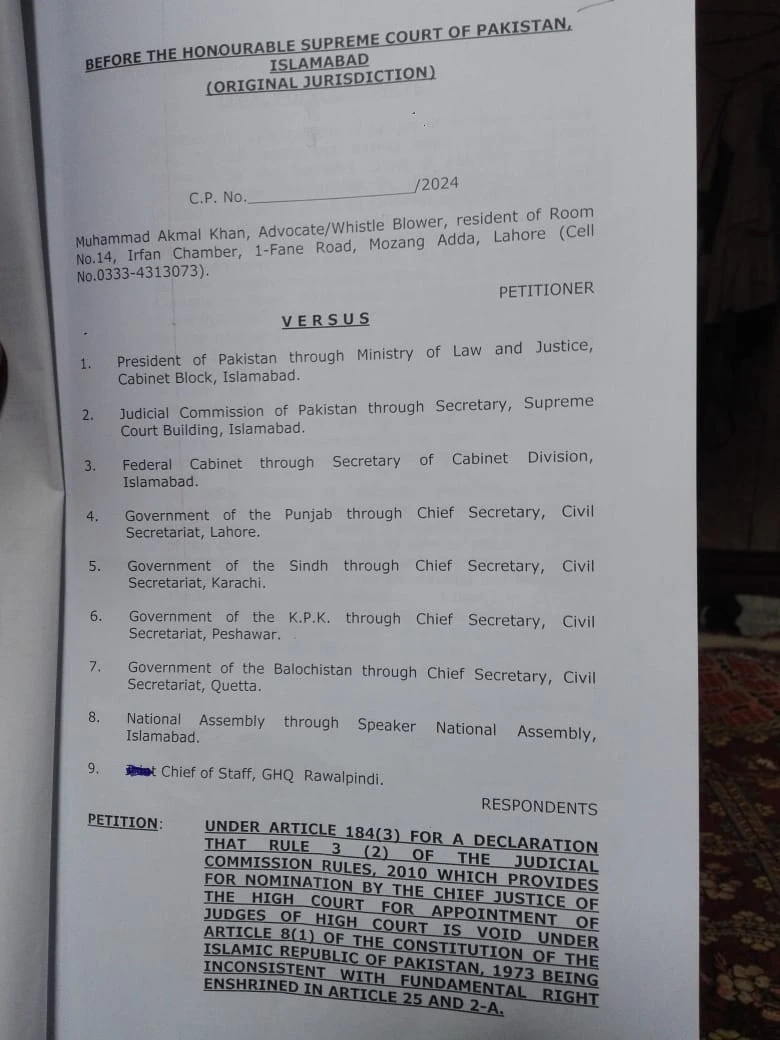
The lawyer has informed the top court that hundreds of eligible advocates are being ignored for appointment as judges in the top judiciary and nor they are being considered in this regard.
Akmal Khan also submitted that former Chief Justice of Pakistan Iftikhar Muhammad Chaudhary made Parliamentary Commission inept by virtue of rendition of judges regarding appointment of the judges including Justice Yawar Ali Khan, Justice Mamoon Rasheed Sheikh, Mazahar Ali Akbar Naqvi and Justice Farrukh Irfan Khan and etc.
Khan argued that Article 175-A of the Constitution was introduced through 18th Amendment enacting that in future the appointments would be made through an independent Commission overseen by a Committee of the parliamentarians.
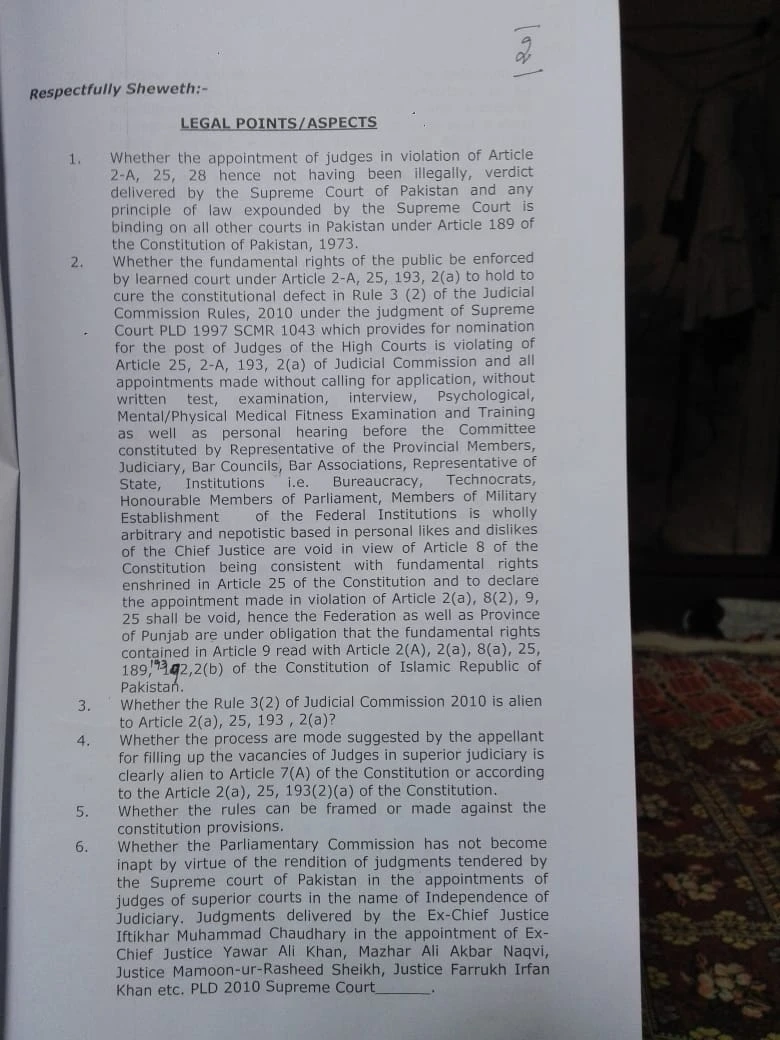
He argued that the Judicial Commission was empowered to make rules regulating the procedure. Nevertheless, Akmal Khan contended, the Rule 3(2) of the said Rules is ultra vires of Article 25. The future of thousands of advocates has turned dark due to the existing procedure of the appointment of the judges.
The petitioner submitted that nominations are always and never on merits unless the persons nominated are selected from amongst a large number of candidates invited through advertisement in the newspapers and are subjected to written examination and Interviews.
“There can be no merit if all eligible persons are not invited to compete. Merit arises out of competition,” said Advocate Khan.
He pointed out that nomination is personal as the chief justices nominate people according to their personal likes and dislikes.
He questioned that “rough and ready choice without any system of selection is not only unethical but also illegal,”.
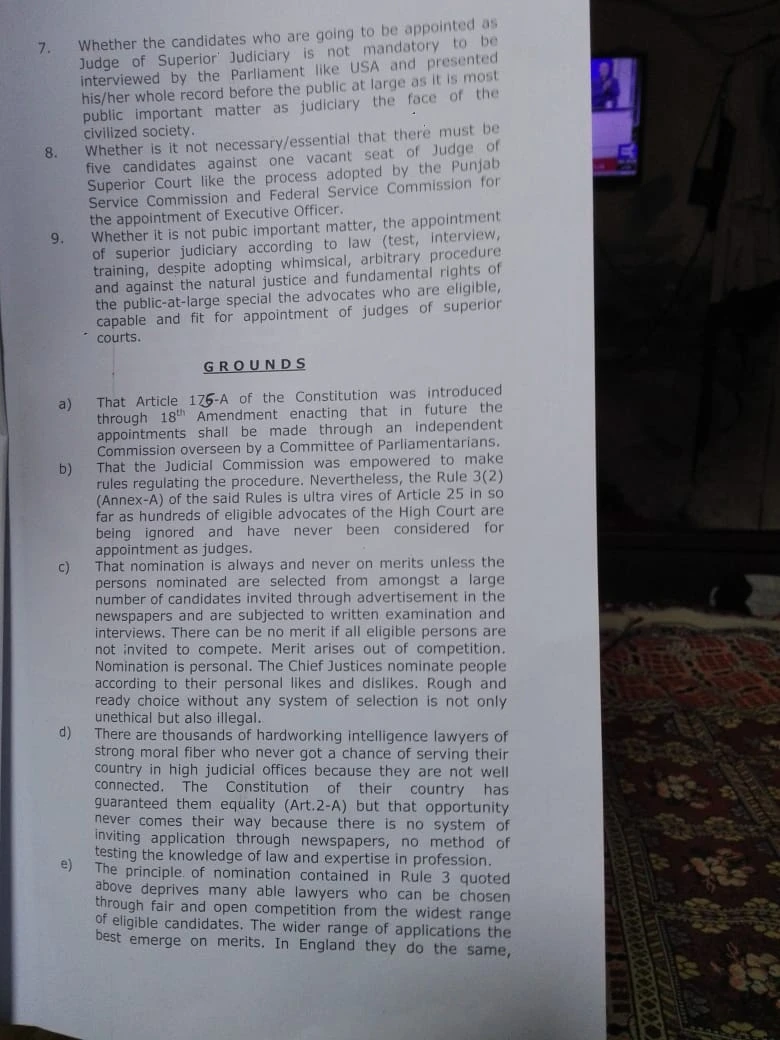
The petitioner also brought it to the light that there are thousands of hardworking intelligence lawyers of strong moral fiber who never got a chance of serving their country in high judicial offices because they are not well connected. The Constitution of their country has guaranteed them equality (Art.2-A) but that opportunity never comes their way because there is no system of inviting application through newspapers, no method of testing the knowledge of law and expertise in profession.
The lawyer submitted that the principle of nomination contained in Rule 3 quoted above deprives many able lawyers who can be chosen through fair and open competition from the widest range of eligible candidates. The wider range of applications the best emerge on merits. In England, Advocate Khan contended that they have set up Judicial Commission which is a Non Department Public Body (NDPB), by Act of 2005.
“The positions In the High Court of England and Wales "are advertised widely in the national press, legal publications, the professional and online,” he said.
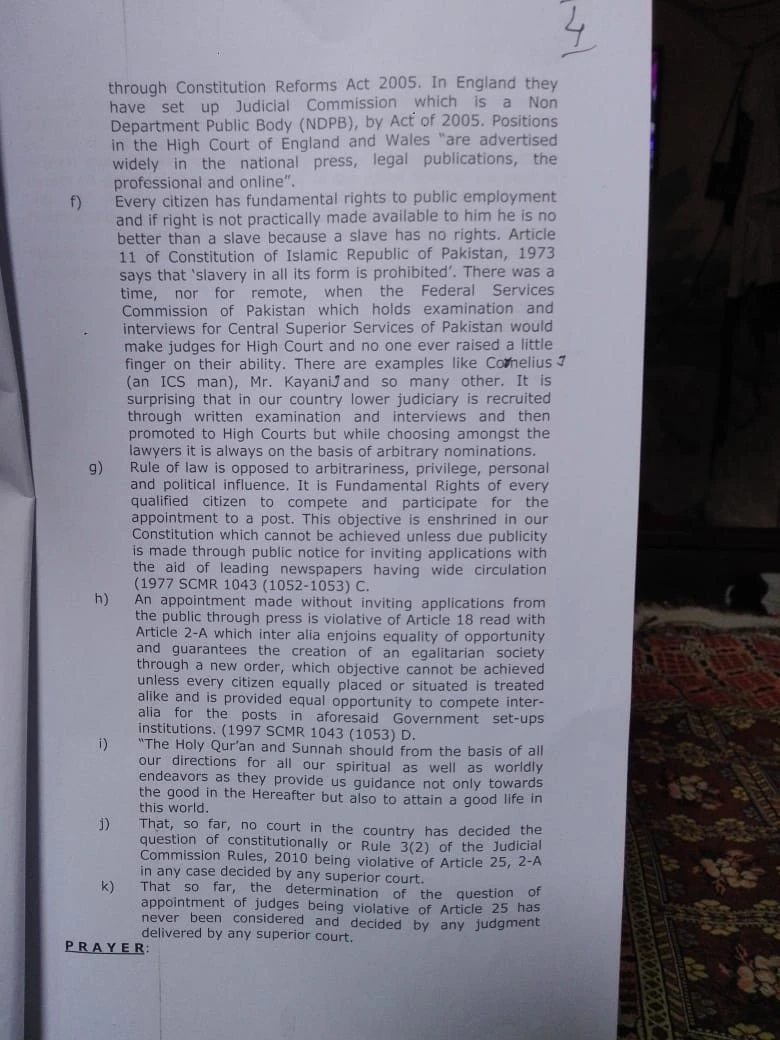
Advocate Akmal Khan also submitted that every citizen has fundamental rights to public employment and if right is not practically made available to him he is no better than a slave because a slave has no rights.
The lawyer contended that Holy Qur'an and Sunnah are main sources of directions for all the spiritual as well as worldly endeavors as they provide complete guidance not only towards the good in the Hereafter but also to attain a good life in this world.
He prayed to the Supreme Court that Rule 3(2) of the Judicial Commission Rules, 2010 which provides for nomination to the posts of Judges of the High Court is violative of Article 25, 2-A. 193 (2) (a) and all appointments made without calling for applications, without written examination and interview is wholly arbitrary and nepotistic based on personal likes and dislikes of the Chief Justices are void in view of Article 8 of the Constitution being inconsistent with Fundamental Right enshrined in Article 25 of the Constitution.
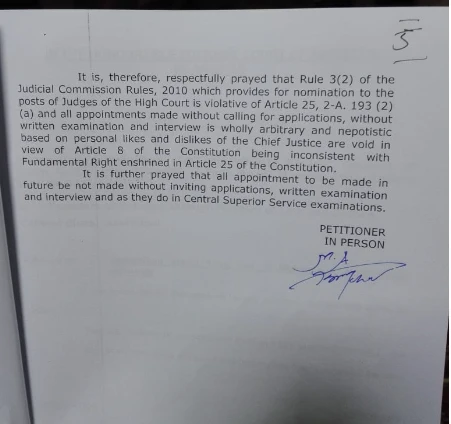
He also prayed the Supreme Court that all the appointments to be made in future be not made without inviting applications, written examination and interview and as they do in Central Superior Service examinations. The lawyer further prayed that the appointments of the judges should be stayed at this time till the disposal of this constitutional petition.
Technology
The Rabbit R1’s first software update addresses its dismal battery life
The Rabbit R1 gets its first OTA software update today, and it includes a fix for an important issue: a fast-draining battery.

Just a week after its initial launch, the Rabbit R1’s first software update is here — and not a moment too soon. Right on top of the list of improvements in the OTA update is “up to 5x” improved idle battery performance, addressing a major pain point for early R1 adopters. It’s also great news for me, specifically, because my R1 is constantly out of power.
Today’s update consists of two parts: an OTA update pushed directly to R1 devices and a cloud update to Rabbit OS. Battery life is far from the only issue addressed — other highlights include an improved music playback UI, improved Bluetooth reliability, and a fix for a compatibility issue when the device is plugged into a car that seems to have bricked at least one R1.
There’s also improved stability for the voice recorder, which is great news because I haven’t been able to get it to work at all. The update is available now for all R1 devices — to download it, R1 owners only need to connect the device to power and Wi-Fi. I plugged mine in, turned it on, and the update started downloading almost immediately.
Impressions of the Rabbit R1 — both our own and those of other tech reviewers — have thus far been less than stellar. However, the company seems committed to issuing frequent software updates, and a fix for the bad battery life was crucial. (I’ve taken to just leaving the R1 off if I’m not planning on using it for a while because the battery drain issue is so bad.)
But I don’t see anything in today’s update that addresses another core complaint: the R1 just doesn’t do enough yet. Maybe something as simple as timers will be in the next update at least.
-
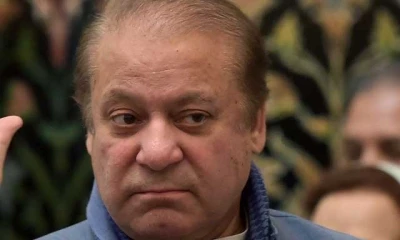
 Pakistan 1 day ago
Pakistan 1 day agoNawaz Sharif returns home after China tour
-

 Business 1 day ago
Business 1 day agoGold price plunges Rs2,000 per tola in Pakistan
-

 Pakistan 19 hours ago
Pakistan 19 hours agoPM Shehbaz, Zardari pays tribute on Labour Day
-

 Sports 1 day ago
Sports 1 day agoEngland announce squad for series against Pakistan
-
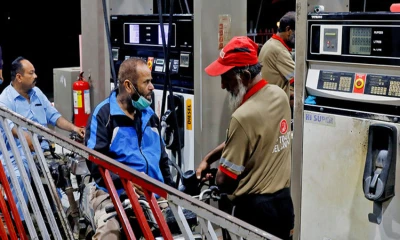
 Business 1 day ago
Business 1 day agoPetrol, diesel prices likely to drop from May 1
-

 Pakistan 20 hours ago
Pakistan 20 hours agoInt'l Labour Day being observed across country today
-
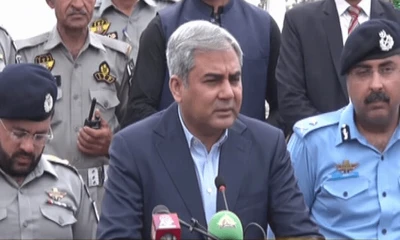
 Pakistan 2 days ago
Pakistan 2 days agoDriving license exclusively for students
-

 Entertainment 2 days ago
Entertainment 2 days agoWedding pictures, videos of ASP Shehrbano go viral





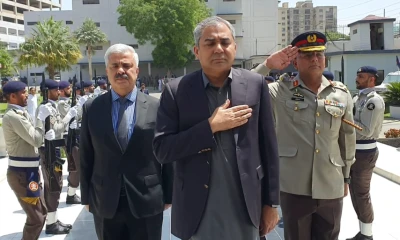







:format(webp)/cdn.vox-cdn.com/uploads/chorus_asset/file/25419476/247092_Student_activist_doxxing_AKrales_1258.jpg)
:format(webp)/cdn.vox-cdn.com/uploads/chorus_asset/file/25419451/247092_Student_activist_doxxing_AKrales_0618.jpg)
:format(webp)/cdn.vox-cdn.com/uploads/chorus_asset/file/25419483/247092_Student_activist_doxxing_AKrales_1438.jpg)
:format(webp)/cdn.vox-cdn.com/uploads/chorus_asset/file/25419482/247092_Student_activist_doxxing_AKrales_1408.jpg)
:format(webp)/cdn.vox-cdn.com/uploads/chorus_asset/file/25419452/247092_Student_activist_doxxing_AKrales_0766.jpg)
:format(webp)/cdn.vox-cdn.com/uploads/chorus_asset/file/25427394/GMbPFpUaQAAgu7P.jpeg)
:format(webp)/cdn.vox-cdn.com/uploads/chorus_asset/file/25427400/GMbPFpWbEAAiOfu.jpeg)
